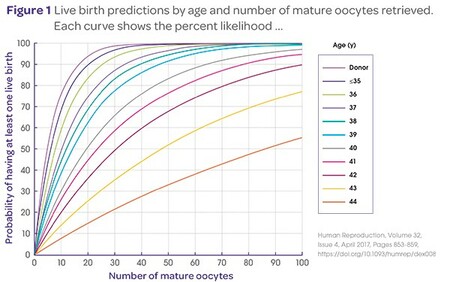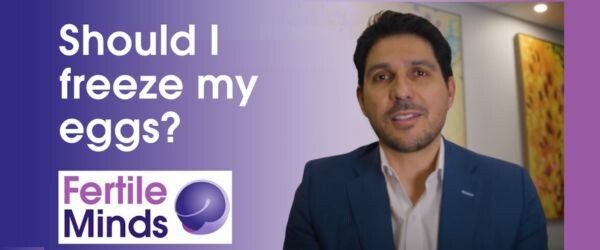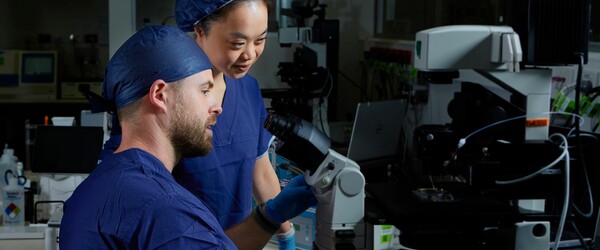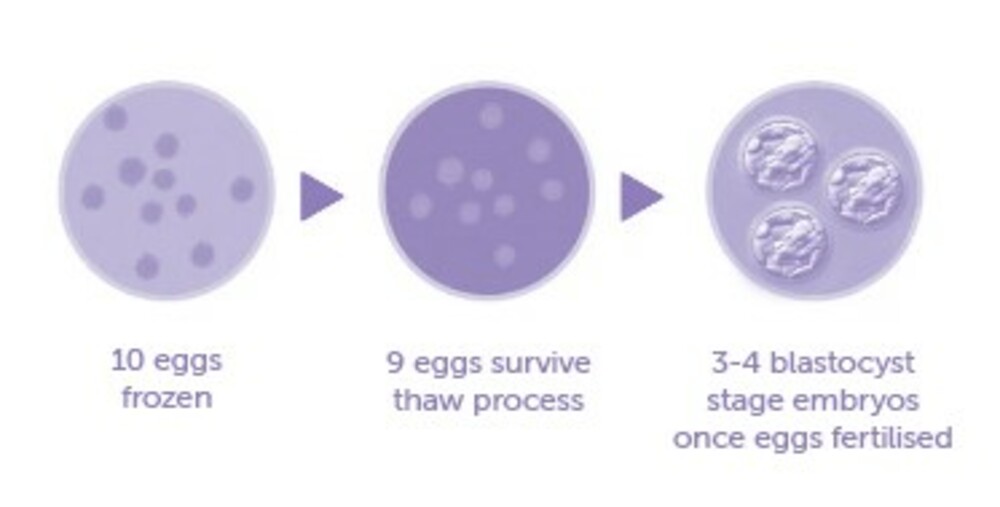Egg Freezing
If you have hopes of having children but aren't quite ready for parenthood — have you thought about putting your eggs on ice?
When it comes to female fertility, timing is the most important factor and being proactive can make a big difference in your chances of becoming a parent. Today, science has given you the option to say ‘yes' to parenthood when you’re ready.
What is egg freezing?
Egg freezing is a method of storing unfertilised eggs to allow you to try to conceive at a later date, when natural conception would be unlikely. It's often seen as a way of preserving the possibility of fertility for those who are not currently in a position to become pregnant, or whose fertility is at risk for medical reasons such as cancer treatment.
Frozen eggs may be stored for many years without significant deterioration. When someone is ready to use the frozen eggs, they are warmed and then fertilised with sperm. The aim is for the fertilised egg to develop into an embryo, which can then be transferred to the uterus giving a chance of pregnancy.
What is the egg freezing process at Melbourne IVF?
View the step-by-step process below.
Egg freezing costs
At Melbourne IVF, the cost of an elective egg freezing treatment cycle is $4,395. View the breakdown of additional expected costs via the table below.
Please note, egg freezing costs can vary depending on individual circumstances and the types of services required. A major factor contributing to the cost of egg freezing is whether the patient is receiving an elective egg freezing treatment or is seeking medical fertility preservation. At Melbourne IVF, we offer priority access to women undergoing cancer treatment. This includes a bulk billed consultation with a fertility specialist and minimised storage fees. Contact us today for more information.
Elective Egg Freezing Costs
Treatment costs correct as of 1st July 2024 Cycle payment (treatment) Estimated out of pocket costs for an initial cycle in a calendar year Estimated out of pocket costs for a subsequent cycle in a calendar year Medical Egg Freezing $8,521 Approx $2,984 Approx $2,311 Elective Egg Freezing $4,494 $4,494 $4,494 Additional Items
Item Cost Hospital Bed Fee for Egg Collection $1,465 Anaesthetist $300 - $600 Elective Egg Freeze Medication Approx $1,500 - $3,000 Medical Egg Freeze Medication Approx $30 per script (cycles may have multiple prescriptions) Initial 12 month storage $550 ($275 every 6 months thereafter) *Please note medication for elective egg freeze is not covered under PBS (Pharmaceutical Benefits Scheme). Patients are required to pay for their medication at the time of their collection from the pharmacy.
Is egg freezing covered by Medicare?
It's important to note, Medicare rebates only apply to medical fertility preservation.
During your initial consultation, your fertility specialist will explain the difference between medical fertility preservation and elective fertility preservation and discuss which would be relevant to you.
Flexible payment options
We've partnered with Zip Money to help spread the cost of fertility treatment. With a 12 and 24-month interest-free period and flexible payment options, you can choose what works for you.
Egg freezing success rates
At Melbourne IVF, we've had the opportunity to assist with hundreds of egg freezing treatment success stories.
The chance of a live birth from frozen ‘vitrified’ eggs is similar to the chance from ‘fresh’ eggs which are usually used in IVF treatment. The two most important factors that determine the chance of having a baby from frozen eggs are your age when your eggs are frozen and the number of eggs that are stored. Currently, we expect the following success rates for egg freezing:
- For a woman aged 35 or under, one stimulated cycle on average would result in the collection of approximately 10 eggs
- Approximately 92% of eggs would survive the freeze and thaw process
Once an egg survives the freeze and thaw process, we would expect it to behave like a fresh egg:
- Approximately 65% of eggs would fertilise
- 40% develop onto day five (blastocyst embryos)
- A single embryo would have a 45% chance of developing into a pregnancy for women who froze their eggs at 35 years or below
The following graph, published in the journal Human Reproduction in 2017, estimates the probability of a live birth according to how many mature eggs a woman freezes at various ages. The graph shows:
- A woman who freezes 10 eggs under the age of 35 has about a 70 per cent chance of having a baby.
- A woman who freezes 10 eggs at the age of 44 has about an 8 per cent chance of having a baby.

Success rates are lower for women over 35, which is why we recommend being proactive about your fertility sooner rather than later. If you're over the age of 38, egg freezing may not be a suitable avenue. However, there are more immediate options that can be explored such as the use of donor sperm.
We always recommend speaking to a fertility specialist to better understand if egg freezing is an option for your particular circumstances.
Learn more about our egg freezing success rates here.
Egg freezing FAQS
Can you test your fertility potential now?
The expected success of egg freezing can be ascertained from an initial assessment of the ovarian reserve using a blood test for Anti-Mullerian Hormone (AMH) and an ultrasound scan of the ovaries and uterus. The AMH test can provide insight into the number of eggs remaining, although it does not give information about the quality of the eggs.
This will help your fertility specialist determine if egg freezing is right for you.
Can you freeze your eggs if you have a low AMH?
If you have a low AMH, your fertility specialist will discuss whether egg freezing is a good option. Although the AMH test can provide insight into the number of eggs remaining, it does not give information about the quality of the eggs. Your fertility specialist will consider the results of the AMH test, your age and other individual factors before recommending egg freezing.
How much does it cost to freeze your eggs?
In Australia, Medicare and other government subsidies are currently only payable for fertility treatment when there is a medical indication. Cycle costs are dependent on your circumstances.
See the table here for a full cost breakdown.
Please call our Public Liaison Advisor on 1800 111 483 or send an enquiry below to discuss further.
Who might consider egg freezing?
You might consider freezing your eggs:
● if your fertility is at risk from a serious illness such as cancer.
● or because you are not in a position to have a baby right now and would like the opportunity to start a family beyond the age at which fertility naturally declines.
If you are contemplating egg freezing, you can also consider other options which may be available to you, such as embryo freezing, donor insemination (for more immediate rather than delayed pregnancy) or the possible use of donor eggs if your own ovarian function is likely to be lost.
How many eggs can you freeze?
Your fertility specialist will discuss the ideal number of eggs required to give you the best possible chance of pregnancy in the future. The number of eggs collected will depend on individual circumstances such as age at the time of the egg collection and other fertility factors. Storage fees include up to 10 eggs per batch.
How long can you freeze your eggs?
You can freeze your eggs for many years until you decide you’re ready to use them. The process of using frozen eggs involves thawing the eggs and finishing the IVF process. The thawed eggs will be fertilised either with your partner’s sperm or donor sperm to create embryos. The best quality embryo will then be transferred into the uterus at the optimal time of your cycle, with the hope of resulting in a pregnancy. Any other embryos created from the thawed batch of eggs will be frozen for future use.
What are the potential risks of egg freezing?
Like most medical procedures, there are potential risks that women may want to consider before they freeze their eggs. Some of the risks include the following:
- Risk of complication during egg collection procedure (although this risk is minimal)
- No eggs being collected
- Some eggs may not survive the freezing process
- Some thawed mature eggs may not fertilise
- Transferred embryos may not result in pregnancy
At Melbourne IVF, our specialists take great care in explaining egg freezing side effects.
At what age should you freeze your eggs?
At what age should you freeze your eggs?
Getting started
Meeting your fertility specialist
Your first consultation with your fertility doctor will involve an assessment of your general health, a review of your medical history, and initial fertility tests.
Backed by a wealth of experience and knowledge, our fertility specialists are happy to answer any questions you may have and help you undergo egg freezing as comfortably as possible.
Preparing for your fertility treatment
After meeting your fertility specialist, we will help you prepare for your treatment by introducing you to your fertility nurse, fertility counsellor if needed, and our administration team. When preparing you for your IVF cycle, we will clarify what your treatment will involve, and any associated costs they may have.
Ready to chat? Speak with our egg freezing experts today.
Our experienced egg freezing specialists would be happy to walk you through the process in more detail, to help you decide if this procedure is the right option for you. Fill out the form to get started.

Download our egg freezing guide
Read the guide
Learn more about the process of egg freezing at Melbourne IVF and whether fertility preservation could be right for you.

Should I Freeze My Eggs? - Fertile Minds
Hear from Dr Joseph Sgroi around what you need to know when it comes to egg freezing.




